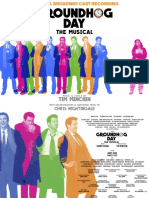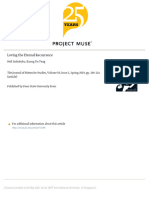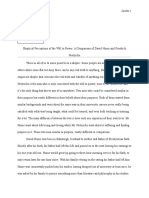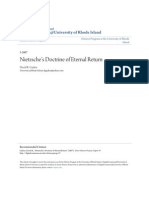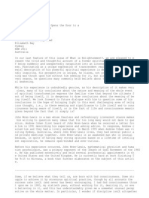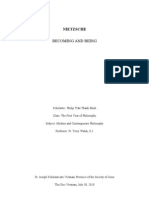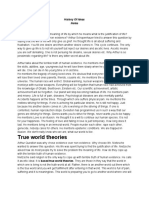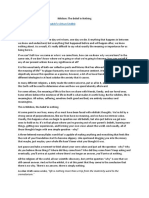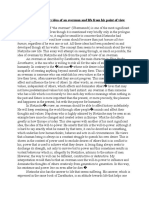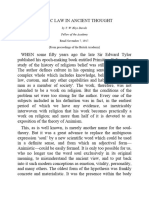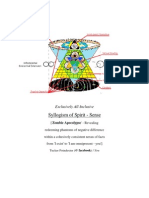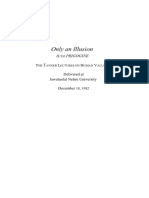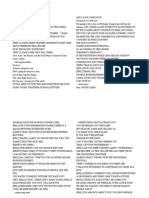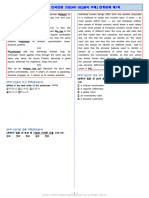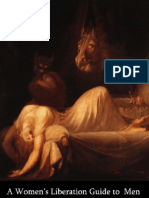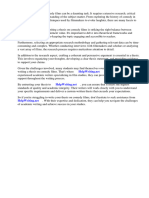Eternal Return
Eternal Return
Uploaded by
ducksquateCopyright:
Available Formats
Eternal Return
Eternal Return
Uploaded by
ducksquateOriginal Description:
Copyright
Available Formats
Share this document
Did you find this document useful?
Is this content inappropriate?
Copyright:
Available Formats
Eternal Return
Eternal Return
Uploaded by
ducksquateCopyright:
Available Formats
Wendy Sze 108349841 PHI247 Professor Hyde The idea of eternal return is the idea of how the time
recurs in the universe infinitely and has been recurring. I know that I could not have been alone in feeling nothing toward this idea upon first hearing it, however, Nietzsche took in this idea and made it the central idea of much of his work. Friedrich Wilhelm Nietzsche (1844 1900) was fascinated with the idea of eternal return, though it only occurred at first as a part of a thought in his writing, a hypothetical question more than anything. The proposition he made, which he claimed could change the way one thinks of and lives life, has been described as Nietzsches thought experiment. He presents his hypothetical question of eternal return in The Gay Science, as though a demon comes to curses someone to live their life exactly as it is again and again, experiencing the same feelings and sequence of all events, such as a spider crawling nearby, and the moonlight shining in this way, even the demon himself appearing as he did just then. Nietzsche asks, Wouldst thou not throw thyself down and gnash thy teeth, and curse the demon that so spake? Or hast thou once experienced a tremendous moment in which thou wouldst answer him: "Thou art a God, and never did I hear anything so divine! If that thought acquired power over thee as thou art, it would transform thee, and perhaps crush thee; the question with regard to all and everything: "Dost thou want this once more, and also for innumerable times?" would lie as the heaviest burden upon thy activity! Or, how wouldst thou have to become favorably inclined to thyself and to life, so as to long for nothing more ardently than for this last eternal sanctioning and sealing? (Nietzsche, The Gay Science, 341) The essential question being asked is how would one react to being given this fate? If life were to recur endlessly, how would one be able to go through with it? I imagine eternal return as being trapped to watch ones life helplessly on repeat countless times. One would not be able to change anything, and would still feel the same feelings as they were experienced, since they were ones own life. What I find most interesting, is that Nietzsche basically asks if there was ever a time so great, a tremendous moment, where one would have been glad and even thankful for eternal return; for being able to experience it not only once more, but for all eternity. Reliving life endlessly can be viewed as both a gift and a curse to Nietzsche, as he called this the heaviest burden. The last sentence of the passage above is Nietzsches best guess at the best way to go through with eternal return. Eternal return is the major theme and problem of the film Groundhog Day, though it is not the same criteria for eternal return as Nietzsches ideas. The film follows a day in the life of Phil Connors,
specifically Groundhog Day, as he experiences the same day over and over again, waking up every single morning at 6am on February 2nd. Groundhog Day has a different take on eternal return, as it only follows a single day, but they key difference besides this is that Phil keeps his consciousness of the eternal return. He is completely aware of the fact that he is reliving this day again and again, unable to escape. Another noteworthy difference is that he was able to kill himself and in general, is able to change what happens through the day, as opposed to Nietzsches eternal return to the same life. Phil Connors takes steps forward and backward in his development throughout the film, but the most fascinating thing about the film is that it is the thought process of a real human being through actually being stuck in Nietzsches thought experiment, but with a way out in the end. The films parallels to Nietzsches thought experiment are not exact, but uncanny and can be used to sum up the way Nietzsche might have thought through his own thought experiment. Phil Connors begins the film an arrogant, self-important, sexist and self-righteous man, who at first thinks of his eternal return as strange dj vu and uses a broken pencil to test if tomorrow ever happens, which it doesnt. He even gets an appointment with a psychiatrist for tomorrow. He stops and thinks to himself that he would have rather gotten a different day to repeat, one where he was happy on vacation, Why couldnt I get that day? Over and over, exactly as Nietzsche described a tremendous moment. Phil even proposes the thought experiment to a pair of friends asking them, What would you do if you were stuck in one place and everyday was exactly the same, and nothing you did mattered? (Groundhog Day)The viewer sees Phil go through a phase of doing whatever he wants because it doesnt matter he essentially gave in to the ideas of nihilism. He was doing anything and everything his heart desired again and again, to the point where it wasnt enough for him anymore. Nietzsche did not have the purpose of driving anyone into nihilism, though the notion of it in this thought process is almost inevitable. One of the ways to interpret this thought experiment is definitely, what then is the point of any choice for any reason? Despite being so focused on how nothing mattered and how nothing had meaning, he found himself looking eventually for meaning in something, something he felt was important. For him, that thing was love. He begins to want to experience reiterations of the day just to find love and find his tremendous moment. The most important development in Phil was that his reasons for doing what he did changed from self-centered reasons, to doing things for other people. Although this came later in his search for love, he developed compassion for the people of Punxsutawney. He met most of the people in the town and began to do good things for them, beginning with the old beggar man when he realized that every
day that he has been reliving, this man has died by the end of it. He tries to do everything that he can to figure out what he could do to keep this man alive by the end of the day, giving this mans life, and all the lives of the people of Punxsutawney a real value to him. When Nietzsche wrote, Perhaps the very renunciation will also furnish us with the strength with which the renunciation itself can be borne; perhaps man will ever rise higher and higher from that point onward, when he no longer goes out into a God, it was meant to show that people should become better so that they would not have look to God for their salvation, but to be better for themselves and others. (Nietzsche The Gay Science, 285)With becoming better, and enduring eternal return Nietzsche believes, To endure the idea of the recurrence one needs: freedom from morality; new means against the fact of pain (pain conceived as a tool, as the father of pleasure...); the enjoyment of all kinds of uncertainty, experimentalism, as a counterweight to this extreme fatalism; abolition of the concept of necessity; abolition of the "will"; abolition of "knowledge-in-itself." (Nietzsche The Will to Power, 1060) This passage relates strongly back to the previous passage from The Gay Science, where one must be able to embrace what comes and what already is, as in the events that happen and the self it happens to. Both of the ways Phil develops, finding a better reason to live his life and a better way to view his life, come down to the fact that Phil has to accept that this is the way his life is, and that it is up to him to make the best of it all. In other words, he had to accept his everything about his fate and embrace it. Phil emerges in the end of the film a changed man a man who has completely reevaluated the way he lives his life, who is completely ready to live the next day when it finally came, and is happy with the way he lived the day before. Nietzsche believes this is the way peoples lives would change for the better when given this thought experiment, and the film is an example of the struggle with coming to these conclusions, it is what would crush thee.
Works Cited Groundhog Day. Dir. Harold Ramis. Perf. Bill Murray, Andie MacDowell. Columbia Pictures, 1993. DVD. Nietzsche, Friedrich Wilhelm, and Walter Arnold Kaufmann. The Gay Science. 1st ed. New York: Vintage Books, 1974. Print. Nietzsche, Friedrich Wilhelm, and Walter Arnold Kaufmann. The Will to Power. Vintage Books ed. New York: Vintage Books, 1968. Print.
You might also like
- Groundhog Day - OBCR - Digital BookletDocument23 pagesGroundhog Day - OBCR - Digital BookletIvan Hallig Panganiban40% (5)
- Advanced Screenwriting Taking Your Writin - Linda SegerDocument190 pagesAdvanced Screenwriting Taking Your Writin - Linda SegerTaha Ali100% (5)
- Existentialism and Groundhog DayDocument6 pagesExistentialism and Groundhog DayJamesNo ratings yet
- Beat Sheet Groundhog Day Kim-1Document10 pagesBeat Sheet Groundhog Day Kim-1Red TurtleNo ratings yet
- Albert Camus - The Myth of Sisyphus - and Other Essays - Vintage (1991)Document129 pagesAlbert Camus - The Myth of Sisyphus - and Other Essays - Vintage (1991)crazyinsomaniac100% (2)
- Diana Abad: Groundhog Day and The Good LifeDocument16 pagesDiana Abad: Groundhog Day and The Good LifemrgogartyNo ratings yet
- Bulletproof SampleDocument24 pagesBulletproof SampleKen Lee0% (1)
- Loving Eternal RecurrenceDocument20 pagesLoving Eternal RecurrenceHugo VedovatoNo ratings yet
- Skeptical Perceptions of The Will To Power - A Comparison of David Hume and Friedrich NietzscheDocument7 pagesSkeptical Perceptions of The Will To Power - A Comparison of David Hume and Friedrich Nietzscheapi-285467118No ratings yet
- Proseminarska Naloga Pri Predmetu Slovenska Filozofija in Filozofska TerminologijaDocument8 pagesProseminarska Naloga Pri Predmetu Slovenska Filozofija in Filozofska TerminologijaFrojdovski OpažajNo ratings yet
- Nietzsche's Doctrine of Eternal ReturnDocument36 pagesNietzsche's Doctrine of Eternal Returnrelic29No ratings yet
- John Wren-Lewis - NDEDocument7 pagesJohn Wren-Lewis - NDEpointandspaceNo ratings yet
- If We All End Up Dying, What's The Purpose of Living?Document21 pagesIf We All End Up Dying, What's The Purpose of Living?Audi WadudNo ratings yet
- The Essence of Psycho-Analysis - SymingtonDocument16 pagesThe Essence of Psycho-Analysis - SymingtonanaNo ratings yet
- The Happiness of Burnout jpl201404Document20 pagesThe Happiness of Burnout jpl201404Luis NavarroNo ratings yet
- Logotherapy Knowing Your GoalsDocument22 pagesLogotherapy Knowing Your Goalsnhzaidi100% (3)
- Erwin Schrödinger - Vedic ThoughtsDocument7 pagesErwin Schrödinger - Vedic ThoughtsBrad SommersNo ratings yet
- Modern Philosophy NietzscheDocument9 pagesModern Philosophy NietzscheThanh Minh TranNo ratings yet
- El Roy HoyabembeDocument2 pagesEl Roy HoyabembeKing Ronne TingzonNo ratings yet
- Klossowski Heterodox Religion and AtheismDocument38 pagesKlossowski Heterodox Religion and AtheismFernandBraudelNo ratings yet
- Life in A Denotata: Philosophizing Frankl's Man's Search For MeaningDocument7 pagesLife in A Denotata: Philosophizing Frankl's Man's Search For MeaningJoseph IcaonapoNo ratings yet
- Helfrich P Laws of The Inner UniverseDocument29 pagesHelfrich P Laws of The Inner Universedamn.good.smmNo ratings yet
- Viktor Frankl: 1 CommentDocument4 pagesViktor Frankl: 1 CommentwoojerNo ratings yet
- Rudolph Binion - Traumatic Reliving in History, Literature and Film-Karnac Books (2010)Document211 pagesRudolph Binion - Traumatic Reliving in History, Literature and Film-Karnac Books (2010)Anna PharkosadzeNo ratings yet
- True World Theories: History of Ideas Notes Friedrich NietzscheDocument7 pagesTrue World Theories: History of Ideas Notes Friedrich NietzschekuaNo ratings yet
- Nietzsche and Redemption - Steven Gambardella - MediumDocument9 pagesNietzsche and Redemption - Steven Gambardella - MediumOrlando Ramos do Nascimento JúniorNo ratings yet
- Sisyphus and The Rolling StoneDocument11 pagesSisyphus and The Rolling StoneVincent MulderNo ratings yet
- 04 DoubtDocument33 pages04 Doubtumityilmaz100% (1)
- NihilismDocument4 pagesNihilismwoo woo wongNo ratings yet
- Nietzsches Notion of Amor FatiDocument23 pagesNietzsches Notion of Amor FatiChris BlakleyNo ratings yet
- It's not a creation, It's a Projection through Expression: A re-launch of Upanishads by rebooting Modern ScienceFrom EverandIt's not a creation, It's a Projection through Expression: A re-launch of Upanishads by rebooting Modern ScienceRating: 5 out of 5 stars5/5 (1)
- Bataille - Erotism, Death and SensualityDocument295 pagesBataille - Erotism, Death and SensualitySeferina BeataNo ratings yet
- About The Soul Question A Walk Through The Visible World To Find The Invisible.-english-Gustav Theodor FechnerDocument118 pagesAbout The Soul Question A Walk Through The Visible World To Find The Invisible.-english-Gustav Theodor Fechnergabriel brias buendiaNo ratings yet
- Lecture - 13, Nietzsche The Crisis of ReasonDocument8 pagesLecture - 13, Nietzsche The Crisis of ReasonMaarit WilleNo ratings yet
- Nietzsche S Idea of An Overman and Life From His Point of ViewDocument5 pagesNietzsche S Idea of An Overman and Life From His Point of ViewAnonymous yAx3MwqpNo ratings yet
- In Search of The True Self - NYTimesDocument22 pagesIn Search of The True Self - NYTimessylviscribdNo ratings yet
- Non-Fiction Book ReviewDocument7 pagesNon-Fiction Book Reviewapi-583801961No ratings yet
- Seth DictionaryDocument33 pagesSeth Dictionarybweisber100% (7)
- Nietzsche vs. HumeDocument2 pagesNietzsche vs. HumeKostasBaliotisNo ratings yet
- TWRD 1917 Cosmic Law in Ancient Thought From Proceedings of The British Academy 1917Document17 pagesTWRD 1917 Cosmic Law in Ancient Thought From Proceedings of The British Academy 1917Bill HamiltonNo ratings yet
- Preface To Abram Deborin's Book 'An Introduction To The Philosophy of Dialectical Materialism' by Plekhanov 1916Document25 pagesPreface To Abram Deborin's Book 'An Introduction To The Philosophy of Dialectical Materialism' by Plekhanov 1916Guilherme MolmostettNo ratings yet
- The Crack in the Cosmic Egg: New Constructs of Mind and RealityFrom EverandThe Crack in the Cosmic Egg: New Constructs of Mind and RealityRating: 3 out of 5 stars3/5 (1)
- City of The Gods John S DunneDocument255 pagesCity of The Gods John S DunnepoprollyNo ratings yet
- 11-Through The Gateway of DeathDocument38 pages11-Through The Gateway of DeathbastodkarNo ratings yet
- The Significance of Seven Sermons To The DeadDocument11 pagesThe Significance of Seven Sermons To The DeadHarveyForge100% (2)
- In the Valley of the Shadow: On the Foundations of Religious BeliefFrom EverandIn the Valley of the Shadow: On the Foundations of Religious BeliefRating: 3.5 out of 5 stars3.5/5 (11)
- Exclusively All-Inclusive Syllogism of Sense (Spirit)Document131 pagesExclusively All-Inclusive Syllogism of Sense (Spirit)Anthony Tucker Poindexter100% (2)
- Physical David Papineau Interviewed by Richard MarshallDocument17 pagesPhysical David Papineau Interviewed by Richard MarshallFrancisco NascimentoNo ratings yet
- ZarathustraDocument8 pagesZarathustraGeo Angelo AstraquilloNo ratings yet
- Gesture of Awareness: A Radical Approach to Time, Space, and MovementFrom EverandGesture of Awareness: A Radical Approach to Time, Space, and MovementRating: 5 out of 5 stars5/5 (1)
- God’s Autopsy and the Living Truth of Soul: A History of Western ConsciousnessFrom EverandGod’s Autopsy and the Living Truth of Soul: A History of Western ConsciousnessNo ratings yet
- RedenciónDocument256 pagesRedenciónmaxi floresNo ratings yet
- Victor Frankl Annotation GuideDocument4 pagesVictor Frankl Annotation Guideapi-361669991No ratings yet
- Clean Up Your Room: The Eternal Spotless Mind of Jordan PetersonFrom EverandClean Up Your Room: The Eternal Spotless Mind of Jordan PetersonRating: 3.5 out of 5 stars3.5/5 (2)
- In the Garden and Other Stories from the Bible: A different kind of book.From EverandIn the Garden and Other Stories from the Bible: A different kind of book.No ratings yet
- Jacob Needleman - The Great Unknown Is Me, Myself (Parabola Interview)Document17 pagesJacob Needleman - The Great Unknown Is Me, Myself (Parabola Interview)Kenneth AndersonNo ratings yet
- Four Views Of I: Instinct, Intellect, Intuition, Intention/Interpretation EditionFrom EverandFour Views Of I: Instinct, Intellect, Intuition, Intention/Interpretation EditionNo ratings yet
- Prigogine 84Document30 pagesPrigogine 84Satish BindumadhavanNo ratings yet
- My NDE beneath the SEA: The Near Death Afterlife Experience of Michael William AngelOhFrom EverandMy NDE beneath the SEA: The Near Death Afterlife Experience of Michael William AngelOhNo ratings yet
- GroundhogDay ReflectionDocument2 pagesGroundhogDay ReflectionRenelie FarangaoNo ratings yet
- SV-40541 SV-40541Document30 pagesSV-40541 SV-40541chwlove1002No ratings yet
- Love Death Todd MayDocument14 pagesLove Death Todd MayDaniel López GonzálezNo ratings yet
- Groundhog Day TranscriptDocument42 pagesGroundhog Day TranscriptTokoro TennosukeNo ratings yet
- A 365 Day Journal Think CBT V 22.08.17Document76 pagesA 365 Day Journal Think CBT V 22.08.17AINHOA RFNo ratings yet
- SV-40541 SV-40541: 2024 올림포스 전국연합 고2 (UNIT 05) (글의 주제) 변형문제 제1회Document29 pagesSV-40541 SV-40541: 2024 올림포스 전국연합 고2 (UNIT 05) (글의 주제) 변형문제 제1회chwlove1002No ratings yet
- All The MonologuesDocument10 pagesAll The Monologuesapi-210892628No ratings yet
- Groundhog DayDocument157 pagesGroundhog DayYo Han Lee100% (2)
- Bulletproof Writing Scripts That Dont Get Shot Down 9781615932993 2018043047 CompressDocument181 pagesBulletproof Writing Scripts That Dont Get Shot Down 9781615932993 2018043047 CompressCharles ThomsonNo ratings yet
- Groundhog Day Phil & RitaDocument5 pagesGroundhog Day Phil & Ritaapi-210892628No ratings yet
- Groundhog Day (Film)Document41 pagesGroundhog Day (Film)Kimon Fioretos100% (1)
- A Womens Liberation Guide To Men Final 2nd Edition - Sam FrymanDocument222 pagesA Womens Liberation Guide To Men Final 2nd Edition - Sam Frymanapi-371639450% (4)
- A Summary of The 'Ethics' by Bentham, Kant, AristotleDocument3 pagesA Summary of The 'Ethics' by Bentham, Kant, Aristotlearniel somilNo ratings yet
- Groundhog DayDocument122 pagesGroundhog DayRaphael Rios100% (1)
- Forensic Scheduling's Groundhog Day - Dubious Practices Recommended' AgainDocument3 pagesForensic Scheduling's Groundhog Day - Dubious Practices Recommended' AgainJibran KhalidNo ratings yet
- IMAGINE Edward Packard BookDocument141 pagesIMAGINE Edward Packard BookLuis Miguel MartínezNo ratings yet
- Using English Movie As An Attractive Strategy To Teach Senior High School Students English As A Foreign LanguageDocument8 pagesUsing English Movie As An Attractive Strategy To Teach Senior High School Students English As A Foreign LanguageDiego EmilioNo ratings yet
- Test Assessing A Language LevelDocument15 pagesTest Assessing A Language LevelDenis SherNo ratings yet
- Scriptwriting Handouts Bfi CompleteDocument43 pagesScriptwriting Handouts Bfi Completeapi-291947860100% (1)
- Visions and Revisions: Hollywood's Alternative Worlds: David SterrittDocument8 pagesVisions and Revisions: Hollywood's Alternative Worlds: David Sterrittpaguro82No ratings yet
- Thesis ComedyDocument7 pagesThesis Comedymichellefrantznorman100% (1)
- 电影《时空恋旅人》影评Document5 pages电影《时空恋旅人》影评nuqjuuhjfNo ratings yet
- Eternal ReturnDocument4 pagesEternal ReturnducksquateNo ratings yet
- Thesis About Comedy FilmsDocument7 pagesThesis About Comedy Filmsstephanieclarkolathe100% (2)
